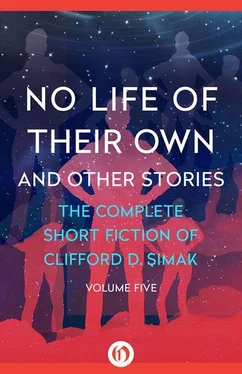But when he’d insisted, they’d finally told him. “There’s only one ridge, really,” they’d said, “but it’s divided into two parts. You go north of town until you reach a cemetery. Just short of the cemetery, you take a left. That puts you on Military Ridge. You keep to the high ground. There are some roads turning off, but you stay on top the ridge.”
“But that you say is Military Ridge. What I want is Parker’s Ridge.”
“One and the same,” said one of the men. “When you reach the end of it, that’s Parker’s Ridge. It stands high above the river. Ask along the way.”
So he’d gone north of town and taken a left before he reached the cemetery. The ridge road was a secondary route, a farm road, either unpaved or paved so long ago and so long neglected that it bore little trace of paving. Small farms were strung along it, little ridgetop farms, groups of falling-down buildings surrounded by scant and runty fields. Farm dogs raced out to bark at him as he passed the farms.
Five miles down the road a man was taking mail out of a mailbox. Thomas pulled up. “I’m looking for Parker’s Ridge,” he said. “Am I getting close?”
The man stuffed the three or four letters he’d taken from the box into the rear pocket of his overalls. He stepped down to the road and stood beside the car. He was a large man, rawboned. His face was creased and wrinkled and wore a week of beard.
“You’re almost there,” he said. “Another three miles or so. But would you tell me, stranger, why you want to go there?”
“Just to look around,” said Thomas.
The man shook his head. “Nothing there to look at. No one there. Used to be people there. Half a dozen farms. People living on them, working the farms. But that was long ago. Sixty years ago—no, maybe more than that. Now they all are gone. Someone owns the land, but I don’t know who. Someone runs cattle here. Goes out West in the spring to buy them, runs them on pasture until fall, then rounds them up and feeds them grain, finishing them for the market.”
“You’re sure there’s no one there?”
“No one there now. Used to be. Buildings, too. Houses and old farm buildings. Not any longer. Some of them burned. Kids, most likely, setting a match to them. Kids probably thought they were doing right. The ridge has a bad reputation.”
“What do you mean, a bad reputation? How come a bad—”
“There’s a whistling well, for one thing. Although I don’t know what the well has to do with it.”
“I don’t understand. I’ve never heard of a whistling well.”
The man laughed. “That was old Ned Parker’s well. He was one of the first settlers out there on the ridge. Come home from the Civil War and bought land out there. Got it cheap. Civil War veterans could buy government land at a dollar an acre and, at that time, this was all government land. Ned could have bought rich, level land out on Blake’s Prairie, some twenty miles or so from here, for the same dollar an acre. But not him. He knew what he wanted. He wanted a place where timber would be handy, where there’d be a running spring for water, where he’d be close to hunting and fishing.”
“I take it the place didn’t work out too well.”
“Worked out all right except for the water. There was one big spring he counted on, but a few dry years came along and the spring began running dry. It never did run dry, but Ned was afraid it would. It is still running. But Ned, he wasn’t going to be caught without water, so, by God, he drilled a well. Right on top that ridge. Got in a well driller and put him to work. Hit a little water, but not much. Went deeper and deeper and still not enough. Until the well driller said, ‘Ned, the only way to get water is to go down to the river level. But the rest of the way it is going to cost you a dollar and a quarter a foot.’ Now, in those days, a dollar and a quarter was a lot of money, but Ned had so much money sunk in the well already that he said to go ahead. So the well driller went ahead. Deepest well anyone had ever heard of. People used to come and just stand there, watching the well being drilled. My grandfather told me this, having heard it from his father. When the hole reached river level, they did find water, a lot of water. A well that would never run dry. But pumping was a problem. That water had to be pumped straight up a long way. So Ned bought the biggest, heaviest, strongest windmill that was made and that windmill set him back a lot of cash. But Ned never complained. He wanted water and now he had it. The windmill never gave no trouble, like a lot of windmills did. It was built to last. It’s still there and still running, although it’s not pumping water anymore. The pump shaft broke years ago. So did the vane control, the lever to shut off the wheel. Now that mill runs all the time. There’s no way to shut it off. Running without grease, it’s gotten noisier and noisier. Some day, of course, it will stop, just break down.”
“You told me a whistling well. You told me everything else, but nothing about a whistling well.”
“Now that’s a funny thing,” the farmer said. “At times, the well whistled. Standing on the platform, over the bore, you can feel a rush of wind. When the rush gets strong enough, it is said to make a whistling sound. People say it still does, although I couldn’t say. Some people used to say it only whistled when the wind was from the north, but I can’t swear to that, either. You know how people are. They always have answers for everything whether they know anything about it or not. I understand that those who said it only whistled when the wind was from the north explained it by saying that a strong north wind would blow directly against the cliffs facing the river. There are caves and crevices in those cliffs and they said some of the crevices ran back into the ridge and that the well cut through some of them. So a north wind would blow straight back along the crevices until it hit the well and then come rushing up the bore.”
“It sounds a bit far-fetched to me.” said Thomas.
The farmer scratched his head. “Well, I don’t know. I can’t tell you. It’s only what the old-time people said. And they’re all gone now. Left their places many years ago. Just pulled up and left.”
“All at once?”
“Can’t tell you that, either. I don’t think so. Not all in a bunch. First one family and then another, until they all were gone. That happened long ago. No one would remember now. No one knows why they left. There are strange stories—not stories, really, just things you hear. I don’t know what went on. No one killed, so far as I know. No one hurt. Just strange things. I tell you, young man, unless I had urgent business there, I wouldn’t venture out on Parker’s Ridge. Neither would any of my neighbors. None of us could give you reasons, but we wouldn’t go.”
“I’ll be careful,” Thomas promised.
Although, as it turned out, there’d been no reason to be careful. Rather, once he’d reached the ridge, he’d felt that inexplicable sense of belonging, of being in a place where he was supposed to be. Walking the ridge, he’d felt this barren backbone of land had transferred, or was in the process of transferring, its personality to him and he’d taken it and made it fit him like a cloak, wrapping himself in it, asking himself: Can a land have a personality?
The road, once Military Ridge had ended beyond the last farmhouse and Parker’s Ridge began, had dwindled to a track, only a grassy hint that a road once had existed there. Far down the ridge he had sighted the windmill, a spidery construction reared against the sky, its wheel clanking in the breeze. He had driven on past it and then had stopped the camper, walking down the slope until he had located the still-flowing spring at the head of the ravine. Going back to the camper, he had driven it off the track and down the sloping hillside, to park it beneath the cottonwood that stood above the spring. That had been the day before yesterday and he had one more day left before he had to leave.
Читать дальше












